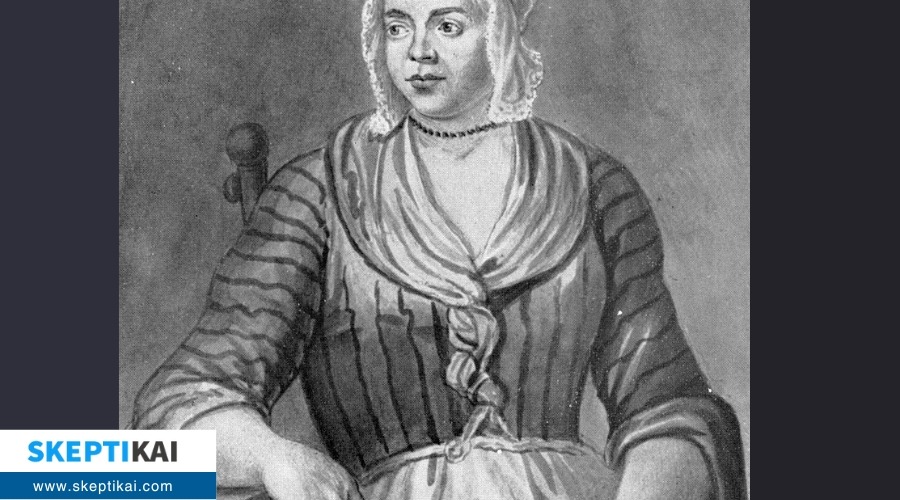Why Was Plato Skeptical About Democracy?
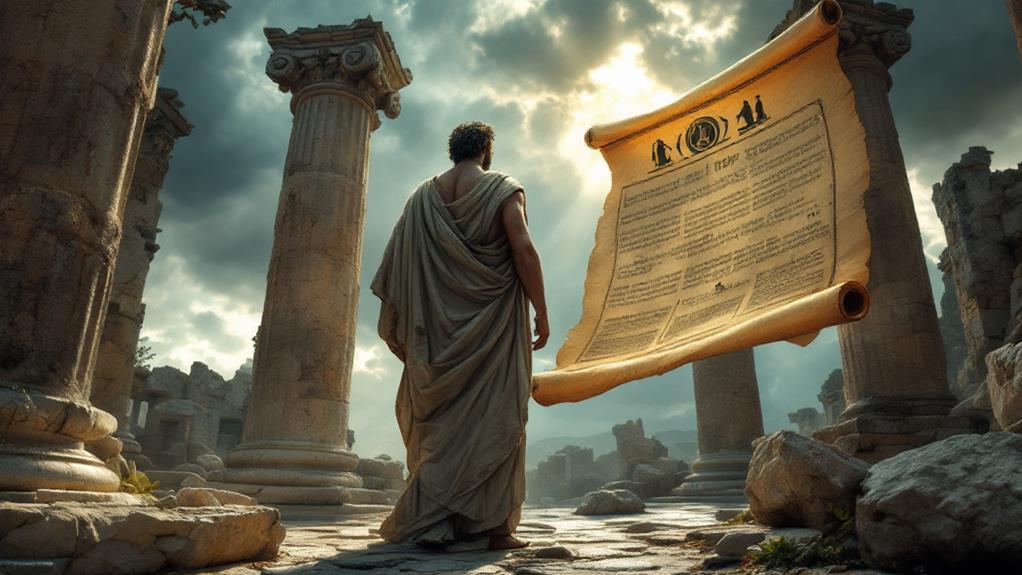
You'll find that Plato was skeptical about democracy due to his experiences in Athens, marred by political instability and the execution of Socrates. He believed democracy gave too much power to the uneducated masses, likening it to letting untrained individuals steer a ship. This, he feared, would lead to poor governance and chaos. Demagogues could easily manipulate public opinion, exploiting emotions and spreading misinformation. Democracy often allowed the tyranny of the majority, where majority rule suppressed minority rights. Plato championed philosopher-kings, who prioritized reason and virtue, thinking they'd guarantee better governance. There's more to uncover about his views.
Historical Context of Plato's Athens
In the backdrop of Plato's life, Athens was a city of profound transformation and turmoil. Political instability was rampant, with power shifting frequently between democracy, oligarchy, and tyranny. You could sense the tension in the air as leaders came and went, leaving citizens unsure about their future. During this time, civic participation was both a privilege and a burden. You were expected to be an active part of the democratic process, attending assemblies, voting on significant matters, and sometimes even serving in government positions. The importance of dedication to civic duty was emphasized, much like the societal contribution expected in the Japanese education system. However, the constant upheaval made it difficult to trust the system. Imagine maneuvering a political landscape where decisions could be reversed overnight and alliances were as fleeting as the Athenian breeze. The very fabric of society seemed to be woven with uncertainty. This environment shaped how you would view democracy, seeing firsthand the chaos that accompanied political instability. In such a setting, it's no wonder you might question the effectiveness of a system that could so easily falter. While civic participation was meant to empower you, it often left you feeling powerless amidst the ever-changing tide of governance in ancient Athens.
The Influence of Socrates' Death

Amidst the political chaos of Athens, the execution of Socrates left a profound mark on Plato's view of democracy. You see, Socrates was more than just a teacher to Plato; he embodied the pursuit of truth through the Socratic method. This method encouraged questioning and critical thinking, pushing people to examine their beliefs. Socrates' trial and subsequent death sentence by a democratic process deeply unsettled Plato. You might wonder why a society built on the idea of citizen participation would execute someone like Socrates. To Plato, this act exemplified the dangers of unchecked political influence and the flaws within a system where the masses, potentially lacking wisdom, held power. The very democracy that was supposed to foster freedom and knowledge had silenced one of its greatest minds. Much like the political instability seen in countries today, Athens' democracy was swayed by rhetoric and emotion rather than reason, failing to protect the wise. This event shifted his perspective, leading him to question if democracy could truly nurture philosophical inquiry or if it was inherently flawed. Through the lens of Socrates' death, Plato's skepticism about the effectiveness of democracy became deeply rooted.
Plato's Critique of Popular Rule
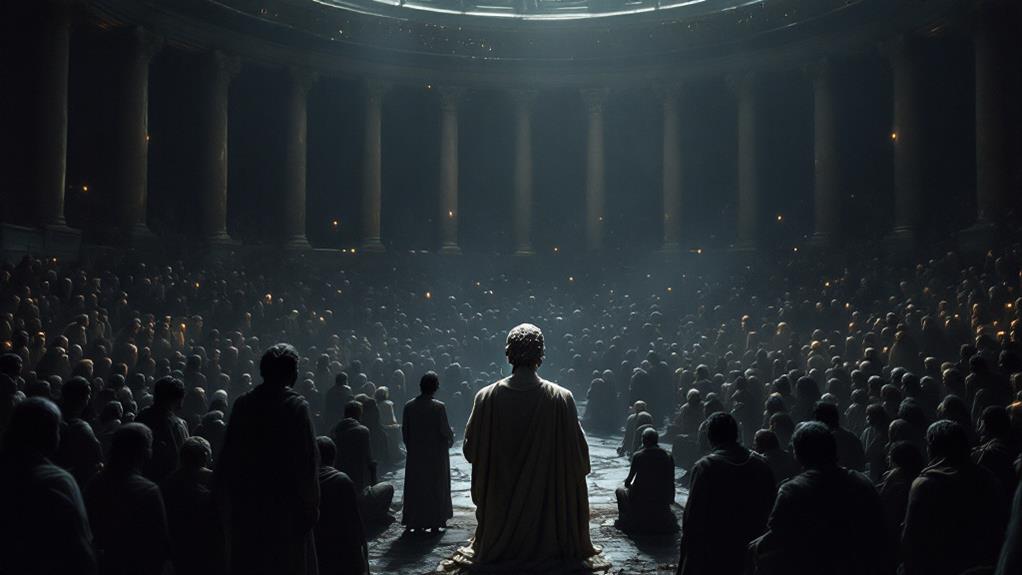
Over time, Plato developed a sharp critique of popular rule, believing it placed power in the hands of those ill-equipped to wield it wisely. In his political philosophy, expressed vividly in Plato's dialogues, he argued that democracy allowed the uneducated masses to make significant decisions, potentially leading to chaos and poor governance. You'd find that Plato saw the democratic process as flawed because it prioritized quantity over quality in decision-making. He was concerned that when everyone has a say, including those lacking the necessary knowledge and virtue, the outcomes could be detrimental.
In his famous work, "The Republic," Plato illustrated his skepticism toward popular rule by comparing governance to a ship's navigation. He questioned if you'd entrust a ship's voyage to an inexperienced crew or to a skilled captain. Likewise, Plato believed that only philosopher-kings, individuals educated in philosophy and ethics, should govern. This idea stemmed from his belief that true knowledge and wisdom were prerequisites for just leadership. Plato's dialogues emphasize that without such guidance, democracy risks devolving into anarchy, as uninformed citizens might prioritize their desires over the common good. Therefore, his critique highlights the tension between freedom and effective governance.
The Role of Demagogues
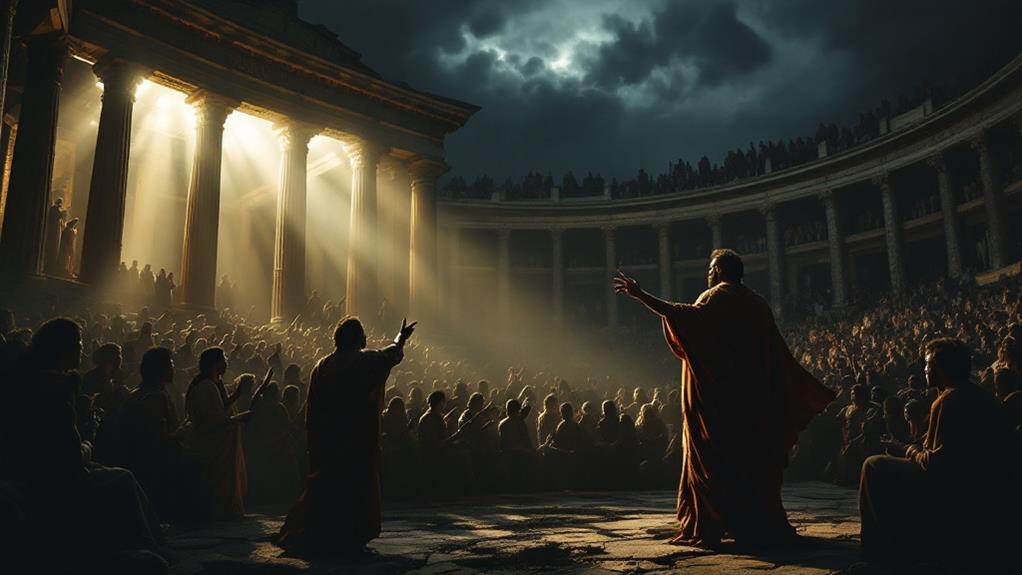
Plato warns that demagogues exploit democracy's vulnerabilities by manipulating public opinion and appealing to base instincts. In a democratic society, where power is derived from the people, demagogues harness their skills in persuasion and public manipulation to gain influence. They often employ demagogue tactics, such as exploiting emotions, spreading misinformation, and creating division among the populace. Their goal is to sway public sentiment in their favor, often prioritizing personal gain over the common good.
You might notice how these tactics destabilize the political landscape. Demagogues thrive on fear and anger, using these emotions to erode rational discourse. By appealing to people's baser instincts, they sideline reasoned argument and thoughtful debate. Instead of promoting informed decision-making, they simplify complex issues into catchphrases and slogans, making it easier to rally support without delving into the nuances of policy.
These manipulative strategies allow demagogues to gain power quickly, but their rise often comes at the cost of democratic integrity. Plato believed that once demagogues take hold, they can lead society toward chaos and corruption, undermining the principles that democracy is supposed to uphold. Recognizing these tactics helps guard against their influence.
The Tyranny of the Majority
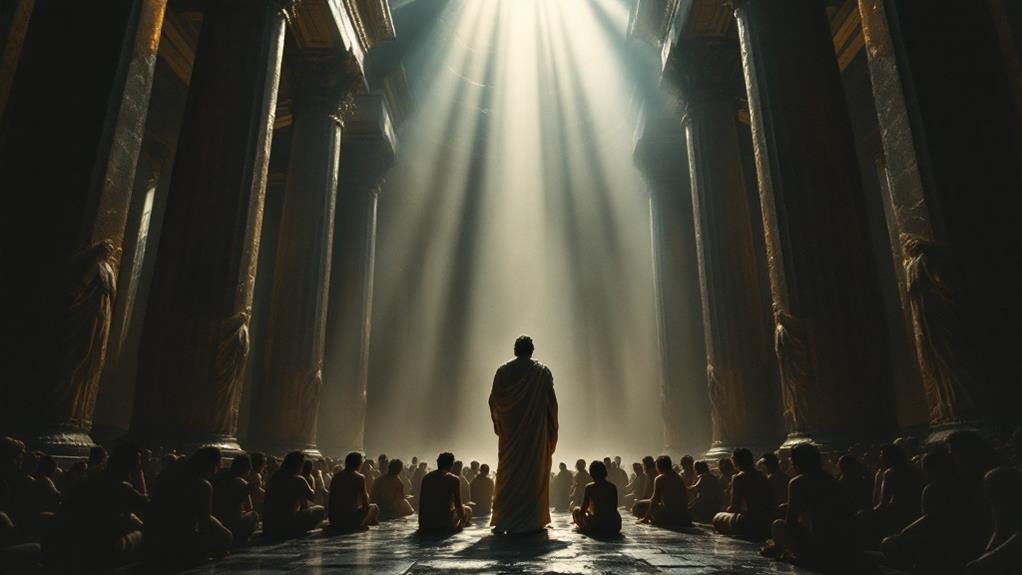
In a democracy, one significant concern is the tyranny of the majority, where the desires of the majority can override the rights and interests of minorities. When majority rule becomes the primary decision-making tool, it can lead to political instability and disenfranchise those not in the majority. Imagine a system where decisions are driven solely by numbers rather than justice or equity. This unchecked power can lead to oppression, as those in the minority may find their voices silenced and their needs ignored.
Consider these emotional consequences:
- Loss of Identity: When the majority imposes its will, minority cultures and values can be eroded, leading to a loss of identity and heritage.
- Social Fragmentation: A society where majorities constantly overshadow minorities can result in a fractured community, creating divides rather than unity.
- Erosion of Rights: If the majority consistently dismisses the rights of the few, this could lead to widespread human rights abuses, diminishing the very essence of democracy.
You must recognize that a democracy that doesn't protect its minorities risks losing its moral compass. Without safeguards, majority rule can spiral into an unstable political atmosphere, fostering resentment and conflict.
The Philosopher-King Concept
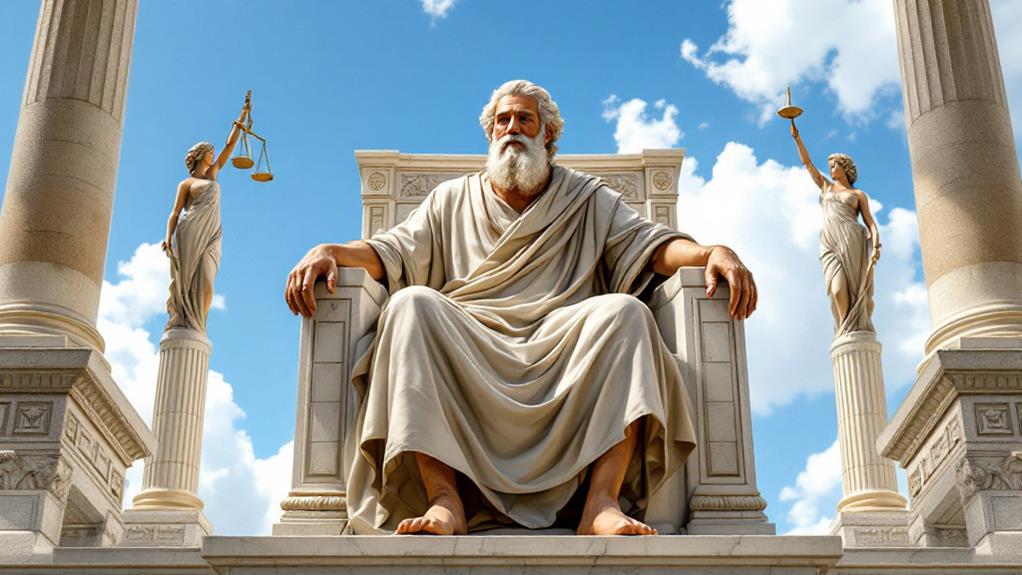
At the heart of Plato's political philosophy lies the intriguing concept of the philosopher-king, a ruler whose wisdom and rationality guide governance. You might wonder why Plato believed this was crucial. He saw the philosopher-king as someone possessing virtues and governance ethics far superior to ordinary rulers. By embodying knowledge and understanding, they could make decisions that benefit society as a whole.
Imagine a ruler who's not swayed by personal gain or popular opinion but instead focuses on truth and justice. This ideal leader prioritizes the common good, relying on their deep understanding of philosophical principles and ethical considerations. Plato argued that only those who truly grasp the philosopher king virtues could create a harmonious and just society.
In practice, this means the philosopher-king wouldn't just impose arbitrary laws. They'd contemplate the underlying principles of fairness and morality, ensuring that every decision aligns with these ethics. By doing so, they aim to prevent the chaos and instability that Plato feared in other forms of government. You can see why he favored this model: it promises a stable and just governance, led by wisdom and guided by ethical integrity.
Democracy vs. Wisdom and Knowledge
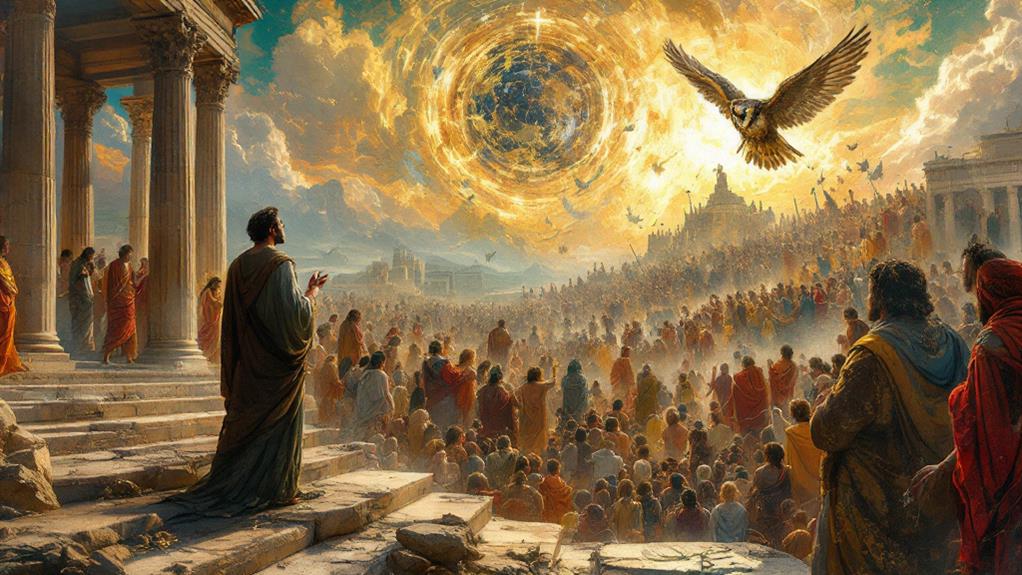
Democracy's allure often lies in its promise of equal participation and representation, but its reliance on the wisdom and knowledge of the masses raises concerns. You might wonder if a system based on the majority's opinion can truly harness the epistemic authority needed for effective governance. Plato feared that without an informed citizenry, democracy could devolve into a popularity contest rather than a pursuit of the common good. When everyone has a say, the challenge becomes ensuring that those voices are informed and capable of making decisions that require deep understanding.
Consider the following points:
- Emotional Appeal: Decisions based on emotion rather than knowledge can lead to irrational policies that may harm society more than help it.
- Misinformation: In a democracy, misinformation can spread easily, clouding the judgment of the populace and leading to choices that undermine long-term welfare.
- Competence: Without cultivating an informed citizenry, the gap between those who should hold epistemic authority and those who do widens, endangering the very fabric of democratic society.
Thus, while democracy aims to empower all, it must balance that with ensuring decisions stem from wisdom and knowledge, not mere opinion.



